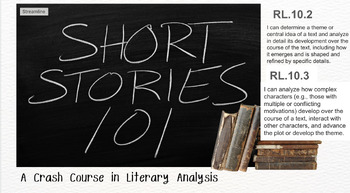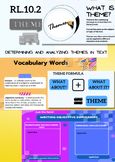Short Stories 101 Guided Notes RL10.2 Identifying Theme Literary Analysis RL10.3
- Google Drive™ folder

Also included in
- Product 1:I developed these slides and guided notes to help break down what the academic standard RL.10.2 is asking.Ready to plug and play in your digital classroom. I post the slides and note sheet online for students that are absent, and present the slides in class. Students are provided with prinPrice $8.79Original Price $18.95Save $10.16
Description
Use this slideshow and guided notes to review and deepen knowledge of literary analysis as you grow more analytical independent readers.
--5 pages of guided notes
With "Short Stories 101: A Crash Course in Literary Analysis", Delve into key vocabulary and essential techniques for analyzing theme, guided by step-by-step instructions that make literary analysis accessible for all learners. With an embedded quick write and group work activation activity, students will actively engage in building background knowledge, fostering a deeper understanding of the material.
This comprehensive resource features 55 visually engaging slides designed to demystify the complexities of short stories. Designed with differentiation in mind an appealing to a variety of learning styles!
No need to worry about lesson planning – guided notes provided in Google DOC format make it easy to plug and play in Google Classroom or your preferred Learning Management System (LMS). Plus, with an embedded mini-lesson on inferencing, students will sharpen their critical thinking skills while unraveling the layers of meaning settings and how they contribute to the development of character.
Help students uncover the secrets of characterization with the "steal" strategy to identify and analyze instances of indirect characterization.
Teach students to master the theme formula to uncover the universal messages woven into narratives.
Whether you're a seasoned educator or new to the world of literary analysis, "Short Stories 101" equips you with the tools and resources needed to inspire and empower your students on their journey through literature.
I created this resource for use as a teacher-led lesson in hybrid and virtual classrooms of 9th and 10th grade EC, ESL, and regular education students but it also worked well with my honors level students as independent work.






